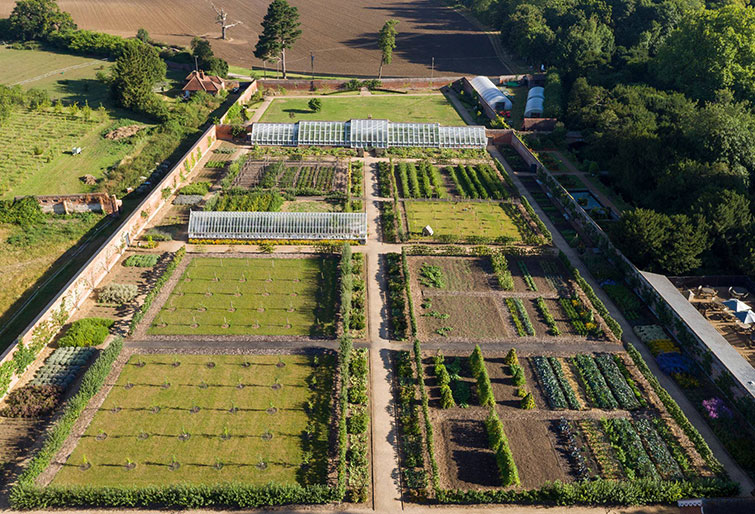The kitchen garden at Audley was founded in the 18th century, and a team of gardeners was employed to provide the house with the highest-quality flowers, fruit, and vegetables year round. These days we have 11 gardeners at Audley and three of those are dedicated to the kitchen gardens alone. We’re also really lucky to have a team of 25-30 volunteers.
Restored in 1999 with the help of Garden Organic, who managed it until 2013, the garden at Audley End is a fine working example of a Victorian kitchen garden. Today we balance traditional horticultural practices with a modern sensibility and more sustainable techniques including modern organic principles.
VICTORIAN GARDENS AND MODERN PRINCIPLES
The Victorian era was a period of cheap manual labour, strict social order and progressive advances in technology and science. Farmers and gardeners were very skilled at looking after their soils but they also used a multitude of chemicals, many of which we’d think of today as poisons.
Although we can use some of the methods that the Victorians would recognise, we’re keen to run the garden in a safer way – one that’s more sustainable and friendlier to wildlife too. For us it’s about balancing traditional horticulural practices with some modern methods – and that’s where organic comes in.
WHAT IS AN ORGANIC GARDEN?
The organic movement started during the first half of the 20th century when modern large-scale agricultural practices began to become more widespread. Some farmers resisted the changes and refused to use synthetic fertilisers and pesticides. Some of these farmers and growers joined together in various associations including the Soil Association, which was founded in 1946. Audley End has been certified organic by the Soil Association since 2007.
The term ‘organic farming’ was created by Lord Northbourne in 1940, although the origins of organic growing can be dated back to the beginning of the 1800s with theories developed in mineral plant nutrition.
Organic gardening is holistic: gardeners need to understand the importance of wildlife. For instance, many crops rely on insects like bees and butterflies for pollination, and without that pollination, they won’t grow. This is why it’s so important to protect pollinators. Organic gardening is one way to do that, even though it can mean that maintenance and preparation takes a bit more effort.
The essence of organic growing is working with nature and the wider ecosystem, rather than against it. And it’s about being aware that the soil is as important as the plants it supports.
By maintaining and building soil health and encouraging biodiversity with beneficial insects and pollinators, we can produce delicious, sustainable food that doesn’t cost the earth.
AUDLEY END KITCHEN GARDENS TODAY
We grow an extensive – and delicious – selection of fruit and vegatables, including around 120 varieties of apple, 70 varieties of pear and wall-trained plums and cherries. Under glass we have the 170ft Vinery ‘Black Hamburgh’ grape vines (one of the most prized fruits for the Victorian table) which are believed to be around 200 years old. We also have a peach house and a selection of heirloom tomatoes.
Our team uses crop rotation for the annual vegetable plots. This is an important tool in organic growing because it helps to reduce a build-up of crop-specific pests and diseases in the soil.
Crop rotation is also important to maintain soil fertility. In the four main vegetable plots at Audley we use a four-year rotation, so one year a bed will be used for onions and root vegetables, the next it will be legumes, then brassicas, and then potatoes, before going back to onions and other roots.
Because of the different fertility needs of each crop, we make the most of the nutrients in the soil without exhausting them. For instance, legumes like peas and beans add nitrogen to the soil (a traditional working practice). So the year after we grow those in a bed we’ll switch to growing brassicas like cabbage and kale, which are nitrogen-hungry.
Next time you visit Audley End, be sure to buy some of our organic produce or eat it in the café - you'll be able to get a real taste of Victorian history.
More to explore
-

Audley End House and Gardens
Enjoy a day out exploring the grounds and estate of one of England’s grandest mansions. Whether you’re exploring the servant’s wing, state rooms, stables, kitchen garden or beautiful grounds, you’ll discover what life was like at a Victorian country house.
-
How to Harvest Apples – The Victorian Way
Meet our Victorian gardener Edgar Ashman, the third gardener at Audley End, and watch him harvest apples for Mrs Crocombe, who is making gateau de pomme. See what Edgar gets up to in the gardens and keep your eyes peeled for a familiar face in the kitchens.
-

Sustainability
The climate and ecological crises are two of the biggest challenges facing our historic sites. With nature in decline and the impact of the changing climate becoming clear, find out how we're reducing our environmental impact and making space for nature.

